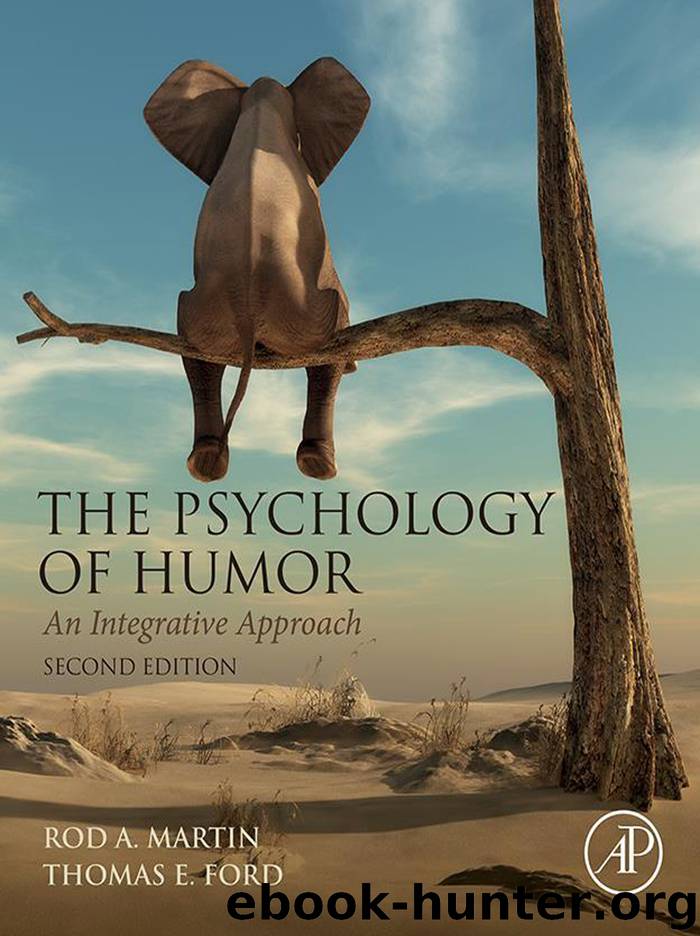The Psychology of Humor by Martin Rod A.; Ford Thomas; & Thomas E. Ford

Author:Martin, Rod A.; Ford, Thomas; & Thomas E. Ford [Martin, Rod A. & Ford, Thomas E.]
Language: eng
Format: epub
Publisher: Elsevier Science & Technology
Published: 2018-06-15T00:00:00+00:00
Figure 9.2 Path model illustrating that the relationship between personality traits and happiness is mediated by self-enhancing humor.
Consistent with the premise that personality traits relate to happiness instrumentally through an active pursuit of positive experiences, Ford et al. (2016) found that the relationship between the four “happy personality traits” and psychological wellbeing is mediated by positive humor styles. That is, people with the four happy personality traits are happier because they engage in self-enhancing humor and affiliative humor in daily life—they maintain a humorous outlook on life, viewing adversity from a humorous perspective, and they use humor in interpersonal settings to enrich the quality of social relationships. Corroborating these findings, Lui (2012) found that the relationship between self-esteem and happiness was mediated by self-enhancing and affiliative humor styles, but not by self-defeating or aggressive humor styles. Similarly, in a study of affective styles and happiness, Ford et al. (2014) found that “approach-oriented” people, those scoring high on Carver and White’s (1994) Behavioral Activating System scale, were happier, in part, because they habitually used a self-enhancing humor style in daily life. Taken together, research suggests that engaging in positive humor styles, especially a self-enhancing humor style, functions as an instrumental strategy by which people attain happiness. Further, it appears that personality functions as a lens that colors the way people view themselves and social settings. The use of positive or negative forms of humor seems to follow from the valence of that general lens and thus contributes to a positive or negative sense of psychological wellbeing (Ford et al., 2016).
Overall, correlational studies do not provide consistent and strong evidence that sense of humor, conceptualized as a global, unitary construct, is related to positive psychological wellbeing. It appears that sense of humor is best conceptualized, not as a unitary disposition that is exclusively positive, but rather as a multidimensional construct that can serve adaptive or maladaptive functions. From this perspective, research derived from Martin et al.’s (2003) humor styles model has shown that self-enhancing humor is an especially healthy humor style, relating most strongly to positive psychological wellbeing. In contrast, self-defeating humor appears to be an especially unhealthy humor style, relating most strongly to indices of psychological distress and lower levels of psychological health. Interestingly, aggressive humor seems to be largely unrelated to overall psychological wellbeing. Although earlier theorists such as Freud, Maslow, and Allport seemed to view aggressive forms of humor as being particularly problematic for overall psychological health, contemporary research findings using Martin et al.’s (2003) HSQ provide little support for this view. As we saw in Chapter 8, The Social Psychology of Humor, however, aggressive humor does seem to be detrimental to interpersonal relationships (Cann et al., 2011; Kuiper et al., 2010).
Download
This site does not store any files on its server. We only index and link to content provided by other sites. Please contact the content providers to delete copyright contents if any and email us, we'll remove relevant links or contents immediately.
Should I Stay or Should I Go? by Ramani Durvasula(7396)
Why We Sleep: Unlocking the Power of Sleep and Dreams by Matthew Walker(6315)
Fear by Osho(4468)
Flow by Mihaly Csikszentmihalyi(4468)
Why We Sleep by Matthew Walker(4178)
Rising Strong by Brene Brown(4178)
How to Change Your Mind by Michael Pollan(4103)
Too Much and Not the Mood by Durga Chew-Bose(4078)
The Hacking of the American Mind by Robert H. Lustig(4062)
Lost Connections by Johann Hari(3876)
He's Just Not That Into You by Greg Behrendt & Liz Tuccillo(3694)
Evolve Your Brain by Joe Dispenza(3472)
The Courage to Be Disliked by Ichiro Kishimi & Fumitake Koga(3228)
Crazy Is My Superpower by A.J. Mendez Brooks(3189)
What If This Were Enough? by Heather Havrilesky(3183)
Resisting Happiness by Matthew Kelly(3182)
Descartes' Error by Antonio Damasio(3147)
The Book of Human Emotions by Tiffany Watt Smith(3121)
In Cold Blood by Truman Capote(3115)
